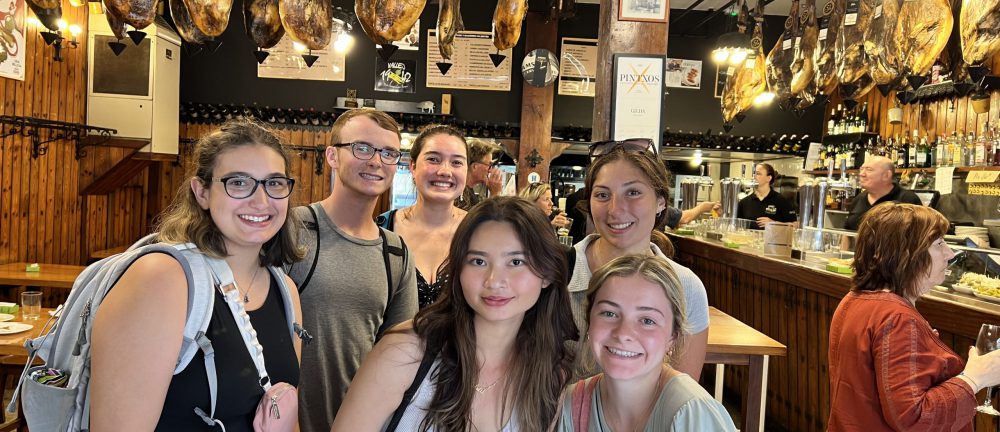Today was the day we met Marti Buckley. Marti is an American from Alabama who fell in love the San Sebastián and although it was a long journey to get here, decided to go back to San Sebastián and stay. She has a fascinating story of how she got here, beginning with a study abroad experience much like then one I am on now. She then went back to the states to finish her degree. She married, started a family, and learned how to cook. She then learned of a program run by the Spanish government where Americans are allowed to go to Spain and teach English for a year. Following gaining this information from an old friend, Marti sent in her application as soon as the next round of applications opened and was finally accepted after a long wait. She took her young daughter and husband to Spain for a year, then another year, and while she no longer teaches English, she continues to live in San Sebastián while working in marketing and writing Basque cook books.
The study abroad group had the privilege of hearing this story in person from Marti herself. One thing I found to be particularly interesting was when she spoke about the second book she is working on about pintxos. Marti spoke about all the research she has done for this cook book including reading every pintxo recipe she could find, although few and far between and quite unspecific. The few recipes she was able to find had no measurements and vague directions such as “cook the fish” or “put the salt on the fish”. She told us that to learn everything she needed to know about pintxos she had to do first person interviews due to the limited literature. I found it particularly interesting that there is such little written literature on pintxos as it is something that is such a large and important part of Basque culture.
It was interesting to hear Marti’s story as I could hear a few similarities to my story in the beginning of hers, as well as the vast cultural differences from America to San Sebastián. An American lifestyle tends to be fast paced, always on the go, and stressful. There is always something that needs to be done with no time for breaks and socialization is not on the list of priorities. Basque culture varies greatly as it is more slow paced, stress is seen as a medical condition, and taking socialization breaks is built into the culture. Marti explained how on the weekends lunch takes all day in San Sebastián. Typically, your cuadrilla would start with a glass of vermouth around 11:30, then go shopping for the ingredients to make lunch. Once your cuadrilla has gotten all of the ingredients you would all go cook lunch together and eat, maybe around 2:30. Followed by another glass of vermouth, ending around 4:00. This is vastly different from American society where we typically have half an hour or an hour for lunch during the week and on the weekends and even more often take it in the go to get the next thing done, especially in the weekends. Even during the week many pintxo bars will close from 3:30 or 4:00 until 7:30 or 8:00 to allow for a siesta.
Another interesting difference between America and San Sebastián is the social groups. In San Sebastián the friends you make in elementary school are the friends you are stuck with for life. You form what is called a cuadrilla which is a small group of friends that is formed when you are in elementary school that stay your friends for life. As opposed to American socialization culture where friends come and go frequently and it is often difficult to find time to spend with them. One important consideration with the concept of a cuadrilla is how immigrants, like Marti, would integrate into a society like this. The Basque people are naturally closed off, making it even more difficult to make friends in a new place across the ocean from home. Marti explained how she formed something like a cuadrilla with the friends she made who are also immigrants to San Sebastián, although it took her a few years to begin making friends when she first arrived.
It was a great and enriching experience to meet Marti Buckley. Our study abroad group was able to hear her story of how she ended up living in San Sebastián and writing Basque cook books as well as learn about Basque culture including cuadrillas, pintxos, and the stress-free life style.

